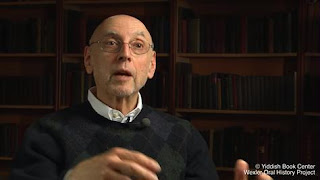The interviews in the growing collection are conducted in Yiddish and/or English with narrators of all ages from a variety of backgrounds.
Most of the interviews are reminiscenses of Jewish life around the world, but some of them are retellings of old Jewish jokes. Here's an oldie but goodie told by psychiatrist Gregory Firman about a devout Catholic priest who gets his wish fulfilled.
Enjoy!
A SPECIAL NOTE FOR NEW EMAIL SUBSCRIBERS: THE VIDEO MAY NOT BE VIEWABLE DIRECTLY FROM THE EMAIL THAT YOU GET EACH DAY ON SOME COMPUTERS AND TABLETS. YOU MUST CLICK ON THE TITLE AT THE TOP OF THE EMAIL TO REACH THE JEWISH HUMOR CENTRAL WEBSITE, FROM WHICH YOU CLICK ON THE PLAY BUTTON IN THE VIDEO IMAGE TO START THE VIDEO.























